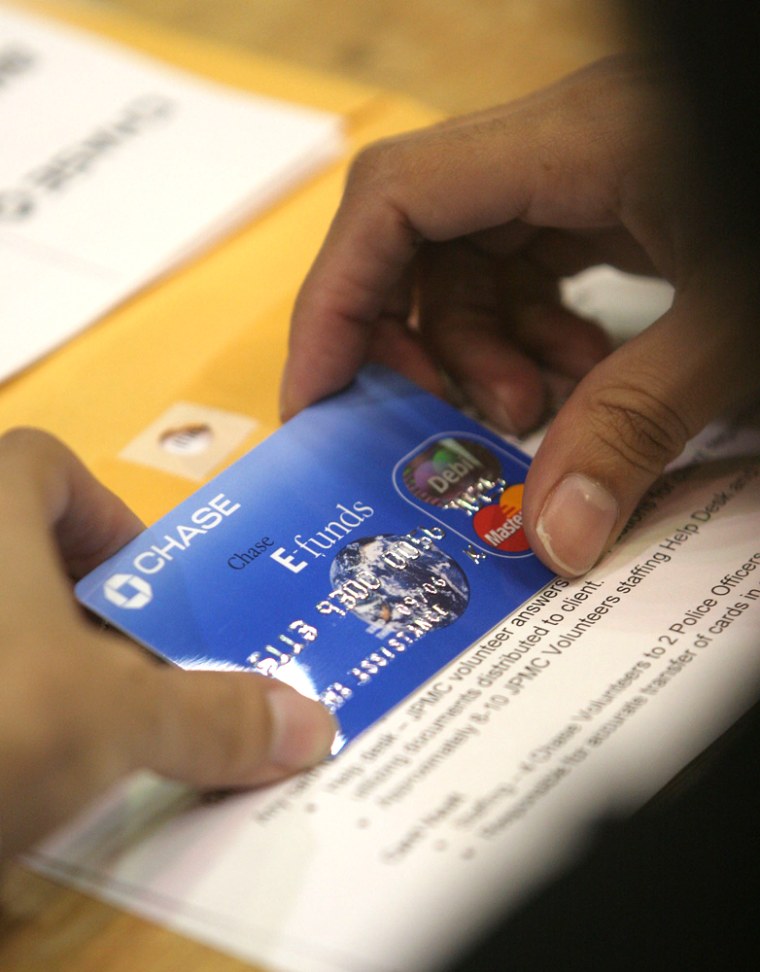Is everyone getting their fair share of FEMA hurricane recovery funds?
Already, FEMA has given away a staggering amount of money to victims of hurricanes Katrina and Rita -- nearly $2 billion to 850,000 people, according to figures provided by Federal Emergency Management Agency's Eugene Kinerney. And much more aid is probably on the way. Victims are eligible to receive up to $26,200 based on a means test, enough for 18 months of living expenses according to government calculations, FEMA says.
With that much money being doled out, there's bound to be criticism.
There were those $2,000 pre-loaded debit cards provided in the week after Hurricane Katrina hit in September. Distribution of the cards led to long lines and much frustration. The debit cards were discontinued after about 10,000 were issued, and they were replaced by direct-deposit electronic transfers. But quietly last week, FEMA cut off all of its no-strings attached instant grants to Katrina victims. The news had some people wondering: Were some victims left out?
"These monies are used for food, diapers, medicines, and other essential items. For FEMA to cut off these funds now is unacceptable," said Congressman William Jefferson, D-LA. "FEMA should reinstate the ... program immediately until all qualified individuals receive the money to which they are entitled.”
No strings attached
Immediately after Katrina made landfall, FEMA began giving out the no-strings-attached $2,000 cash payments in a program called "expedited assistance." The money could be spent on anything the victims chose. But those Katrina victims who haven't gotten their cash payments yet are out of luck. Expedited assistance was cut off on Sept. 26, FEMA said.
Bennie Thompson, the ranking Democrat in the House Committee on Homeland Security, issued a scathing press release.
"The execution of FEMA’s Expedited Assistance program after Hurricane Katrina has been marred by error since it was announced," Thompson wrote. "Soon after the program began, it was abruptly cancelled, only to be reactivated. Evacuees were forced to wait in daylong lines, only to be turned away when funds in certain locations ran out...Cutting off emergency survival funds for those in need is a sign of the incompetent and bureaucratic Department of Homeland Security at work.”
An aid at Thompson's office said it wasn't fair that the assistance was cut off without announcement, creating a confusing situation where some victims got their $2,000 and others didn't -- with no list of rules explaining why.
"There is no hard and fast policy on when this starts and when this ends," she said. "A lot of these people have been told to apply online, when they have no electricity and no telephone." And others, who had telephone service, repeatedly got busy signals when calling, she said. "There will be a continued distrust of the project."
One grant program ends, another begins
FEMA confirms the emergency cash program ended for Katrina victims on Sept. 26, but Rita victims were still eligible on Monday. There was no announcement of the cutoff: No one at FEMA's offices could point to an official stop and start policy about expedited assistance. FEMA's Kinerney said simply, "(The program) had done its job.”
But those who did not receive a $2,000 payout may still get a fair shake, insisted Kinerney. He said all hurricane victims are entitled to that maximum total assistance of $26,200. Victims who didn’t take anything in the first slice can get more later on, he said. In the end, everyone is entitled to the same assistance, based on their ability to pay -- a means test that includes current income, insurance payments, and other factors.
Expedited assistance may be gone, but the agency has moved into a second phase of aid specifically targeting housing. The program is called THAP, or Transitional Housing Assistance Program. Victims get $2,358 to pay three months of rent or hotel charges, Kinerney said. The amount is calculated from average living expenses for three months around the country.
Victims can continue to get housing grants for 18 months, he said, as long as they provide receipts proving the money was spent on housing.
"We are pushing to get people out of shelters and into more interim housing," Kinerney said.
Were some left out? A good question
In Louisiana alone, about 580,000 residents who registered for FEMA’s instant grants have received $1.2 billion. But, in the midst of a chaotic situation, where communication services like telephone and Internet access are still spotty, Rep. Thompson is asking a critical question: How many people haven't yet seen a FEMA agent or the FEMA Web site?
“Thirty days is fine if you can actually reach FEMA during those thirty days. Many folks couldn’t get to a FEMA recovery center to stand in line and only got busy signals when they tried to call,” Thompson said. “Once again the FEMA devotion to bureaucracy has trumped common sense. When are they going to throw away their old playbook and figure out how to actually help people?”
